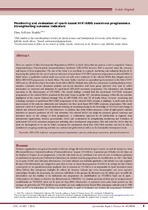Monitoring and evaluation of sport-based HIV/AIDS awareness programmes: strengthening outcome indicators
Abstract
There are number of Non-Governmental Organisations (NGOs) in South Africa that use sport as a tool to respond to Human
Immunodeficiency Virus/Acquired Immunodeficiency Syndrome (HIV/AIDS), however, little is reported about the outcomes
and impact of these programmes. The aim of this study is to contribute to a generic monitoring and evaluation framework by
improving the options for the use of outcome indicators of sport-based HIV/AIDS awareness programmes of selected NGOs in
South Africa. A qualitative method study was carried out with seven employees of five selected NGOs that integrate sport to
deliver HIV/AIDS programmes in South Africa. The study further involved six specialists/experts involved in the field of HIV/
AIDS and an official from Sport Recreation South Africa (SRSA). Multiple data collection instruments including desktop review,
narrative systematic review, document analysis, one-on-one interviews and focus group interview were used to collect
information on outcomes and indicators for sport-based HIV/AIDS awareness programmes. The information was classified
according to the determinants of HIV/AIDS. The overall findings revealed that the sport-based HIV/AIDS awareness
programmes of five selected NGOs examined in this study focus on similar HIV prevention messages within the key priorities
highlighted in the current National Strategic Plan for HIV/AIDS, STIs and TB of South Africa. However, monitoring and
evaluating outcomes of sport-based HIV/AIDS programmes of the selected NGOs remains a challenge. A need exists for the
improvement of the outcome statements and indicators for their sport-based HIV/AIDS awareness programmes. This study
proposed a total of 51 generic outcome indicators focusing on measuring change in the knowledge of HIV/AIDS and change in
attitude and intention towards HIV risk behaviours. In addition, this study further proposed a total of eight generic outcome
indicators to measure predictors of HIV risk behaviour. The selected NGOs can adapt the proposed generic outcomes and
indicators based on the settings of their programmes. A collaborative approach by all stakeholders is required, from
international organisations, funders, governments, NGOs and communities to strengthening monitoring and evaluation of
sport-based HIV/AIDS awareness programmes including other development programmes. This will assist the NGOs that use
sport for development to be able to reflect accurately the information about their HIV/AIDS activities and also be able to
contribute to on-going monitoring activities at a national and global level as well as to the Sustainable Development Goals.

